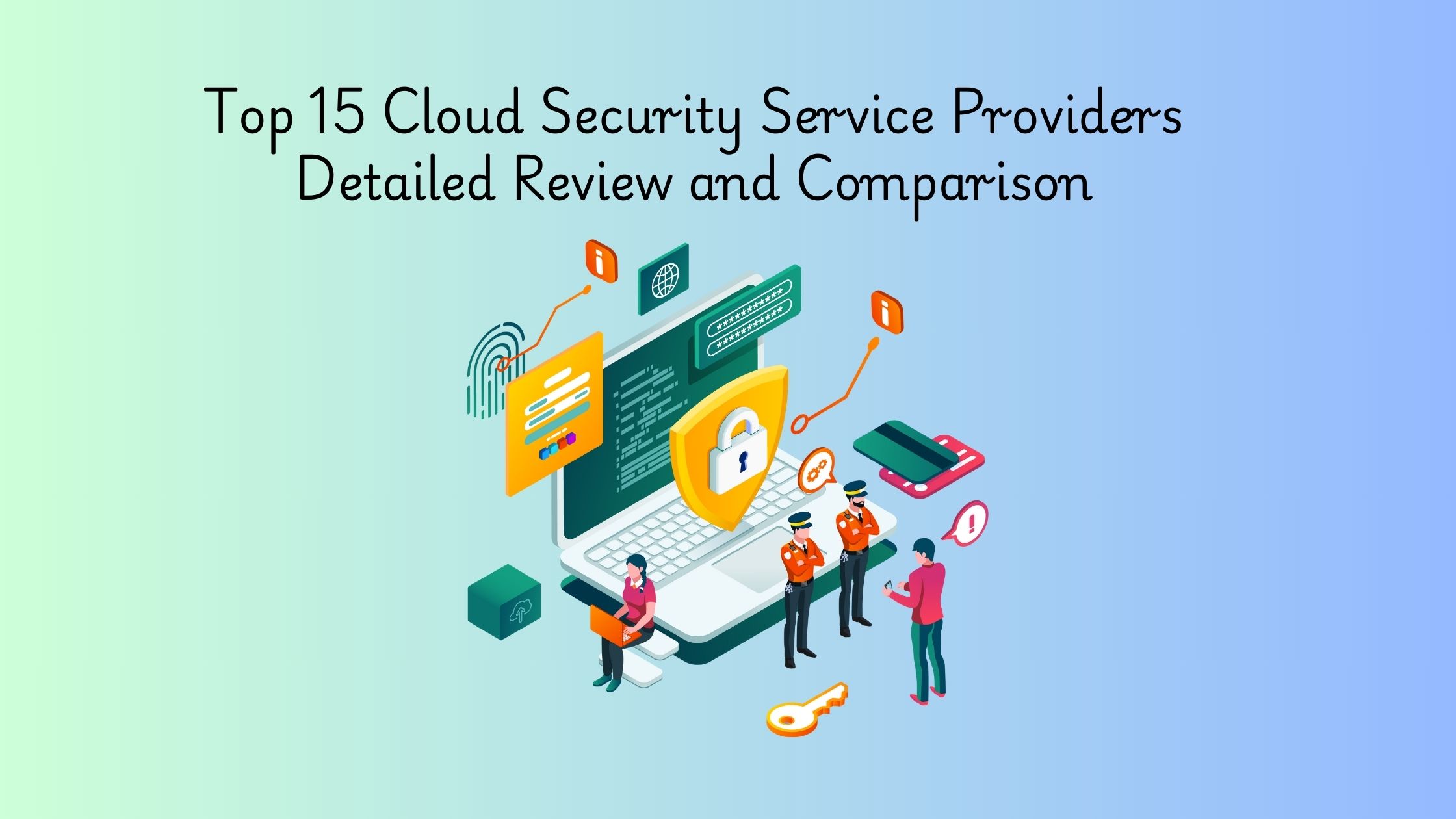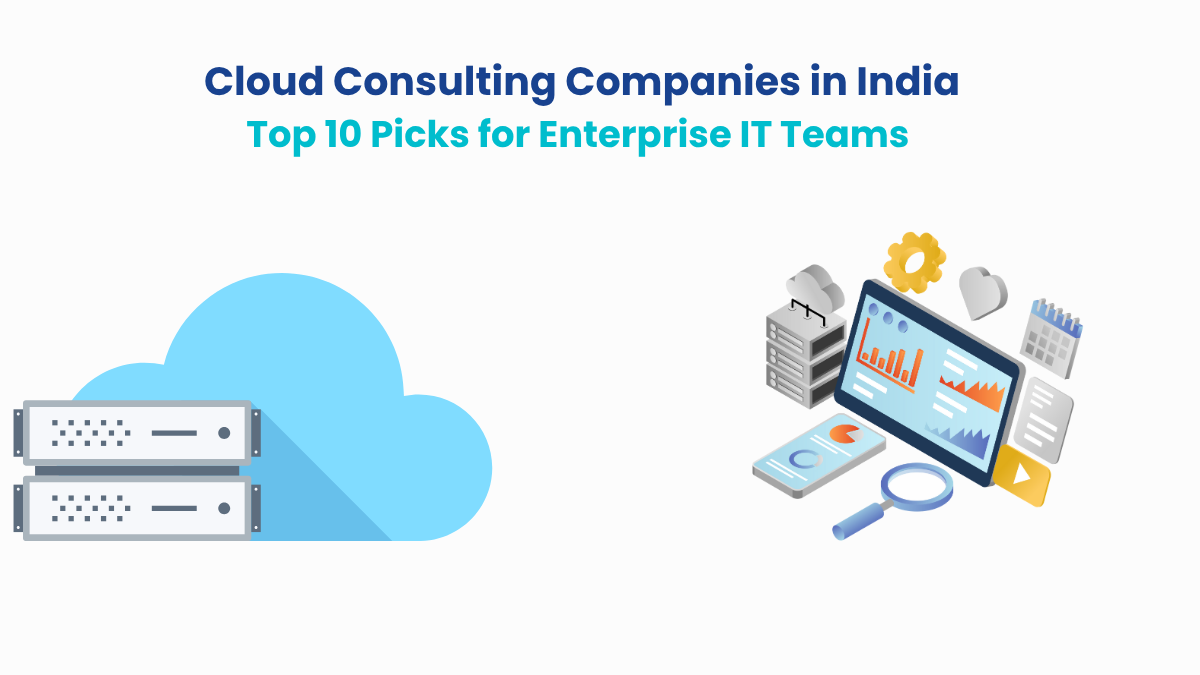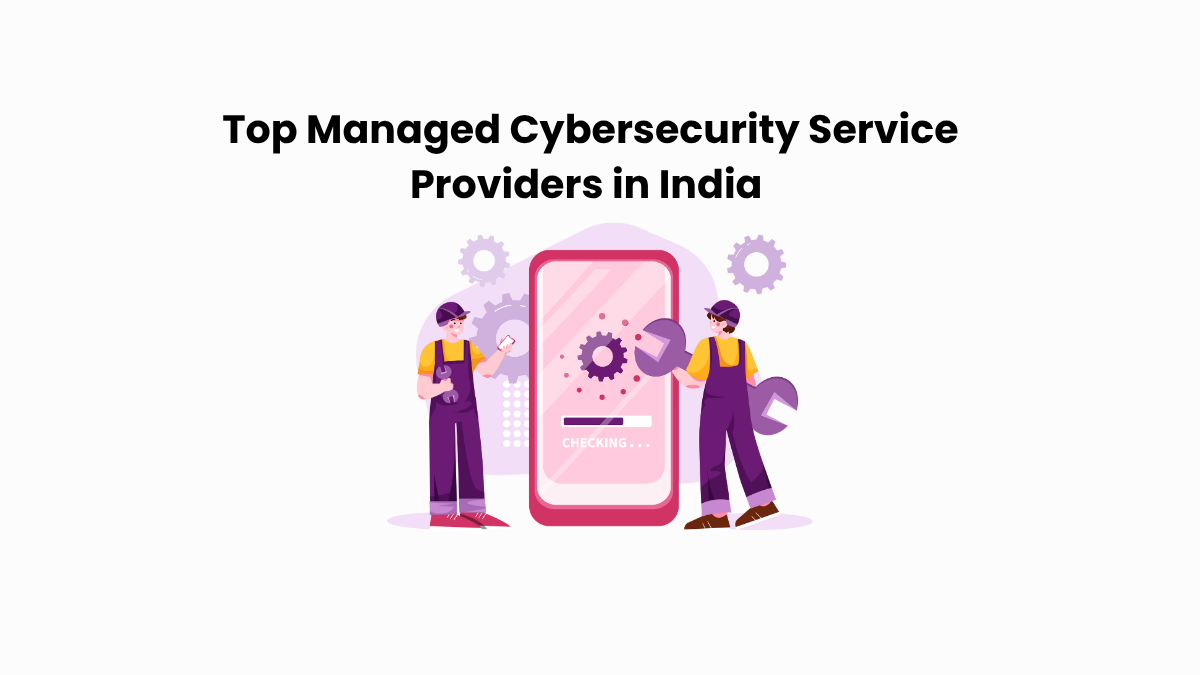Navigating the world of cloud security is no small feat, especially when 92% of businesses have already migrated part of their IT operations to the cloud. You know the stakes: one small misconfiguration, and suddenly your sensitive data is at risk.
In fact, 88% of cloud breaches are caused by human error. The challenge? Finding a cloud security service provider that not only protects your data but also simplifies the complex web of security protocols.
If you have been dealing with issues like inconsistent encryption, escalating breach costs, or maybe even a lack of visibility into who’s accessing your data, you’re not alone. The truth is, 57% of organizations have expressed low confidence in their cloud security.
But here’s the good news: You don’t have to be one of them.
In this guide, we’ll break down the top 15 cloud security service providers. No fluff, just the features, pros, and cons that actually matter so that you can make an informed decision.
Ready to take control of your cloud security? Let’s dive in!
Detailed Review of Top 15 Cloud Security Service Providers
#1. Datacipher Solutions

Datacipher is a leading provider of cloud security services, offering tailored solutions to safeguard every aspect of your cloud architecture. Their services are designed to address the complex security needs of modern businesses, ensuring comprehensive protection against emerging cyber threats.
Whether you’re managing a hybrid cloud, public, or private infrastructure, Datacipher’s holistic approach ensures that your applications and data are shielded from unauthorized access, breaches, and potential data leaks.
Key Features
- Cloud Threat Detection: Advanced monitoring tools for real-time threat detection, minimizing the response time for potential security breaches.
- Visibility and Compliance: Full visibility into cloud operations with automated compliance checks to avoid regulatory issues.
- Infrastructure as Code (IaC) Security: Ensures that your cloud infrastructure is free from vulnerabilities by enforcing industry-compliant practices.
- Data Security: End-to-end encryption of cloud data, coupled with strict access controls to prevent unauthorized access.
- Serverless and Container Security: Optimized for modern architectures, ensuring security for serverless applications and containers.
Pros
Excellent customer support and hands-on approach to cloud security management.
Highly customizable solutions tailored to different industries.
Expertise in multi-cloud security, ensuring seamless integration across platforms.
Cons
Slightly higher pricing tier compared to competitors, which may be a consideration for smaller businesses.
Steeper learning curve for new users unfamiliar with their advanced security configurations.
Not in the mood to scroll? This video gives you the full rundown of the top 15 cloud security providers—who stands out, what to watch for, and how to choose right. Start here if you want the big picture fast.
#2. CrowdStrike

CrowdStrike is another top cloud security solutions provider, primarily because of its Falcon Cloud Security platform. Offering end-to-end protection from code to cloud, CrowdStrike is known for its advanced threat detection capabilities, leveraging AI and machine learning to monitor and protect cloud infrastructures.
Key Features
Cloud-Native Application Protection (CNAPP): Unified posture management across cloud infrastructure, applications, and data, which simplifies security operations.
Threat Intelligence & Real-Time Detection: Using AI, CrowdStrike’s Falcon platform detects both malware and anti-malware-based attacks in real time, reducing response times and mitigating potential damage.
Cloud Detection and Response (CDR): Offers advanced monitoring capabilities across cloud workloads to ensure any anomalies are immediately flagged and addressed.
Agentless & Agent-Based Options: Flexibility to secure diverse cloud environments, including serverless architectures, containers, and Kubernetes.
Pros
Advanced AI and machine learning capabilities for real-time threat detection.
Industry-leading threat hunting and intelligence services.
Comprehensive platform that covers multiple cloud environments and integrates well with existing infrastructures.
Cons
Higher pricing, which may be prohibitive for smaller businesses
The complexity of features may require expert management to fully optimize.
#3. Palo Alto Networks (Prisma Cloud)

Palo Alto Networks offers its Prisma Cloud platform, a robust solution that secures every stage of the cloud application lifecycle, from code development to runtime protection, integrating multiple security functionalities into a single, unified solution. Known for integrating cloud-native application protection (CNAPP), Prisma Cloud provides organizations with real-time visibility, automated threat detection, and AI-driven risk management to protect cloud workloads.
Key Features
Cloud Workload Protection (CWP): Offers real-time threat detection and vulnerability management for containers, serverless functions, and VMs.
Multi-Cloud and Hybrid-Cloud Support: Supports AWS, GCP, Azure, and on-prem environments, offering a unified security view across all cloud environments.
AI-Powered Risk Insights: Uses Precision AI to prioritize and detect risks across cloud infrastructure and applications, allowing for faster incident response and risk management.
Pros
Strong container and workload protection, recognized for robust scanning and real-time threat detection.
AI-driven risk prioritization helps security teams focus on critical issues.
Seamless integration with DevSecOps workflows, enabling proactive security management.
Cons
Can be complex to implement and manage, especially for organizations without dedicated security expertise.
Higher cost compared to other cloud security solutions, which may limit its accessibility for smaller businesses.
#4. Microsoft Azure Security

Microsoft Azure offers a multi-layered approach to security, combining built-in controls, advanced threat intelligence, and compliance management. Azure’s security is integrated across its physical data centers, infrastructure, and operations, providing an all-encompassing shield against evolving threats. Microsoft also leverages its vast global presence, including over 3,500 cybersecurity experts, to protect business assets through Azure’s intelligent threat detection and prevention systems.
Key Features
Azure Defender: Provides continuous threat protection across Azure workloads, including virtual machines, containers, and databases, offering real-time visibility and automated alerts.
Microsoft Intelligent Security Graph: Azure analyzes vast data sources such as 400 billion emails and 1 billion Windows device updates to identify and mitigate security threats in real time.
Azure DDoS Protection: Protects Azure resources from distributed denial-of-service (DDoS) attacks, ensuring uptime and stability in the face of traffic spikes and malicious attacks.
Identity and Access Management (IAM): Using Azure Active Directory (Entra ID), organizations can securely manage identities and control access to critical resources across on-premises and cloud environments.
Pros
Strong integration with Microsoft products like Office 365 and Active Directory, offering seamless security management across hybrid environments.
Extensive global data center network provides high availability and low-latency performance.
Azure’s security is part of its cloud offering, reducing the need for businesses to invest in third-party security tools for fundamental protections.
Cons
High complexity for smaller organizations, which may require expert knowledge to fully leverage its advanced features.
Can be costly for extensive workloads due to Azure’s pricing structure, especially for advanced security features.
#5. AWS Security Hub

AWS Security Hub is a cloud security service provider that centralizes and automates security management across AWS environments. Designed to provide comprehensive security posture management, AWS Security Hub offers continuous monitoring, automated compliance checks, and integrates with multiple AWS services like GuardDuty, Inspector, and Macie to give users a unified view of their cloud infrastructure security.
Key Features
Centralized Security Management: AWS Security Hub provides a unified dashboard that aggregates data from various AWS security services to give you a consolidated view of your security status.
Automated Compliance: With predefined security standards like CIS AWS Foundations Benchmark and PCI DSS, AWS Security Hub allows organizations to automatically check their cloud infrastructure for compliance violations.
Real-Time Threat Detection: The integration with AWS services like GuardDuty and Macie ensures real-time detection of threats such as unauthorized access, data breaches, and potential vulnerabilities.
Pros
Strong integration with AWS services for seamless cloud security management.
Reduces the complexity of compliance and threat management through automation.
Provides real-time visibility into security risks with a centralized dashboard.
Cons
Can be costly for larger organizations, especially as usage scales.
Limited functionality for non-AWS environments, making it less suitable for hybrid cloud setups.
#6. Google Cloud Platform
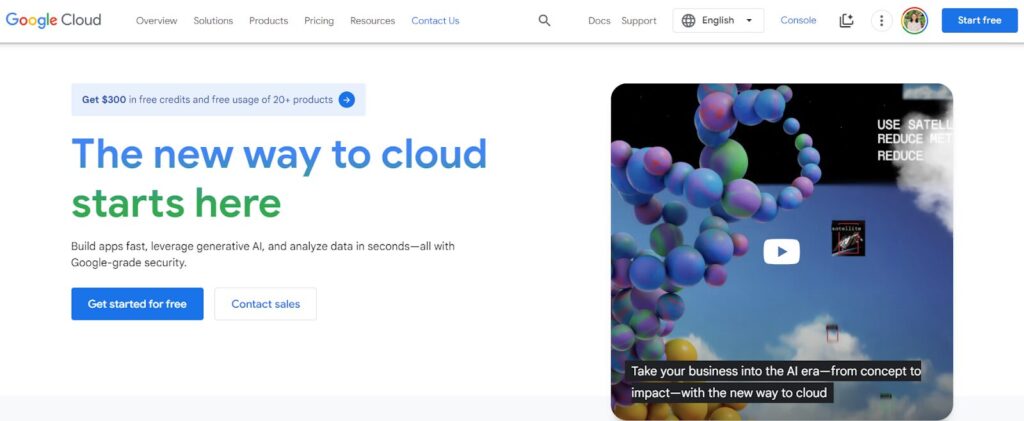
Google Cloud Platform (GCP) offers robust cloud security services designed to safeguard cloud infrastructure, data, and applications. Its multi-layered security architecture, combined with global infrastructure and advanced AI-driven tools allows for secure, scalable, and fast data processing. With security integrated at every layer of the cloud, from storage to networking, GCP offers deep visibility and threat detection capabilities, leveraging the same infrastructure that secures Google’s own services.
Key Features
Security Command Center (SCC): Provides a unified view of security risks, offering real-time monitoring for misconfigurations, vulnerabilities, and threats across Google Cloud.
VPC Service Controls: Extends the security perimeter for managing access to Google Cloud services, preventing unauthorized networks from accessing sensitive data.
Encryption by Default: GCP provides end-to-end encryption for data at rest and in transit, utilizing 256-bit AES encryption to secure sensitive information.
AI and ML-Powered Threat Detection: GCP’s tools such as Chronicle Security Operations leverage artificial intelligence and machine learning to detect potential threats and anomalies faster than manual systems.
Multi-Layered DDoS Protection: With Cloud Armor, GCP protects against distributed denial-of-service (DDoS) attacks, ensuring uninterrupted access to services, even during heavy traffic spikes.
Pros
Strong integration with Google’s global private network, offering enhanced security for data in transit.
Built-in compliance features and certifications, including PCI DSS, HIPAA, and GDPR, suitable for regulated industries.
Advanced threat detection capabilities with automated responses.
Cons
Pricing complexity and potential high costs, especially for organizations with significant workloads.
Can be challenging for smaller businesses to fully leverage GCP’s extensive and advanced security features.
#7. Trend Micro

Trend Micro offers cloud-native security, through its Trend Vision One™ platform, designed to secure workloads, applications, and data across multi-cloud and hybrid environments. The platform goes beyond basic cloud security by providing comprehensive visibility, automated threat detection, and response capabilities. It enables businesses to manage risks effectively and maintain compliance while simplifying the overall security management process
Key Features
Cloud-Native Application Protection Platform (CNAPP): Offers integrated workload and application protection with continuous risk assessment across cloud environments.
Detection and Response (XDR): Provides multi-layered protection by integrating endpoint, network, and cloud security, reducing the attack surface.
Automated Detection & Response: Automates threat mitigation across workloads, APIs, and containers, accelerating response times and reducing manual intervention.
Pros
Comprehensive visibility and security coverage across hybrid and multi-cloud environments.
Automated threat detection and response reduce operational burdens.
Strong compliance support with automated risk management.
Cons
Some features, like application testing, could benefit from more robust documentation.
Higher cost for small businesses compared to other cloud security service providers.
#8. Broadcom
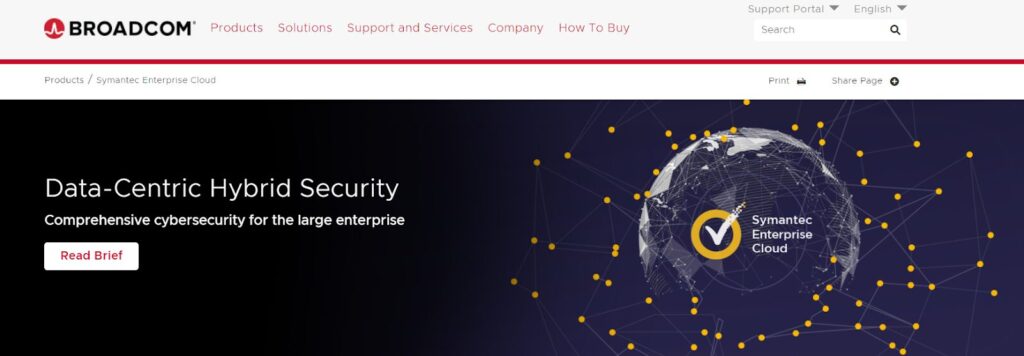
Symantec, now part of Broadcom, is another leader in cloud security solutions with its Symantec Enterprise Cloud platform. It provides comprehensive protection, addressing modern cybersecurity challenges with solutions that span across endpoints, cloud, networks, and information protection. Symantec is designed for large enterprises with complex infrastructures, offering a unified approach to threat prevention, data protection, and compliance.
Key Features
Secure Web Gateway (SWG): Protects users from web-based threats with advanced malware detection, sandboxing, and web isolation techniques.
Data Loss Prevention (DLP): Ensures that sensitive data is protected across endpoints, cloud applications, and network traffic.
Zero Trust Network Access (ZTNA): Applies zero-trust security to IaaS applications and cloud workloads, improving access control.
Global Intelligence Network (GIN): Leverages a global network of telemetry and AI algorithms to detect and respond to over 100,000 targeted attacks every month.
Pros
Comprehensive security across cloud, hybrid, and on-premises environments.
Advanced threat detection and prevention with global intelligence and AI integration.
Strong DLP and encryption management across cloud services.
Cons
Resource-intensive features can impact performance on devices.
Post-Broadcom acquisition, some users have experienced difficulties with licensing and support.
#9. Cisco Cloud Security

Cisco Cloud Security, powered by Cisco Security Cloud, offers an integrated cloud-native platform to protect data, applications, and users across hybrid and multi-cloud environments. With solutions like Cisco Umbrella, Secure Endpoint, and Zero Trust, Cisco aims to deliver scalable, AI-driven security for modern enterprises.
Key Features
Cisco Umbrella: Delivers DNS-layer security, blocking malicious domains before they reach the network, ensuring real-time protection for remote and cloud-based users.
Zero Trust Access: Implements Zero Trust principles to verify every request, ensuring only authenticated users access cloud applications.
Cloud Web Security: Provides deep web traffic inspection and malware protection, even for off-network users.
AI-Driven Security: Uses AI to provide real-time threat detection and mitigation, improving response times to cyberattacks.
Pros
Strong integration with Cisco’s networking solutions, creating a unified security framework across the entire infrastructure.
Scalable solutions for both small and large enterprises, offering flexible deployment options.
Cons
The extensive feature set may be complex for smaller organizations to fully utilize.
Higher cost compared to some competitors, particularly when integrating multiple services.
#10. Qualys

Qualys is a cloud-native security provider known for its integrated solutions that combine vulnerability management, compliance, and real-time threat detection. Its TotalCloud platform provides deep visibility into multi-cloud environments, enabling organizations to protect their cloud workloads and ensure compliance. With comprehensive tools that span cloud security posture management (CSPM), workload protection, and container security, Qualys offers businesses the ability to detect and remediate security risks across hybrid and multi-cloud infrastructures.
Key Features
Cloud Workload Protection (CWP): Provides continuous monitoring and vulnerability management for workloads across public and private clouds.
Cloud Security Posture Management (CSPM): Detects misconfigurations and non-compliant resources in multi-cloud environments, helping organizations maintain a secure cloud posture.
TruRisk Insights: Offers prioritized risk assessment, focusing on the most critical vulnerabilities and providing actionable insights for remediation.
Infrastructure as Code (IaC) Security: Scans IaC templates to detect vulnerabilities before deployment, ensuring secure cloud infrastructure setup.
Pros
Real-time monitoring with lightweight agents that do not affect system performance.
Strong integration with cloud service providers like AWS, Microsoft Azure, and Google Cloud.
Unified risk management platform that provides full visibility and control over cloud assets.
Cons
Some users report a steep learning curve when integrating and managing multiple Qualys tools.
Pricing may be higher compared to competitors, especially for smaller organizations.
#11. Zscaler

Zscaler is a cloud-native security provider focused on enabling secure digital transformation through its zero-trust architecture. Known for its Zero Trust Exchange, Zscaler provides security by inspecting all traffic and enforcing strong access control. It offers cloud security solutions that protect users, data, and applications across distributed work environments, ensuring secure access and reducing attack surfaces.
Key Features
Zero Trust Network Access (ZTNA): Ensures secure user-to-app and app-to-app access without the need for VPNs, reducing the risk of lateral movement and external threats.
Cloud Security Posture Management (CSPM): Continuously monitors cloud environments like AWS, Azure, and Google Cloud for misconfigurations and compliance violations.
Secure Web Gateway (SWG): Protects against web-based threats by inspecting traffic and enforcing security policies across the cloud.
Unified Policy Console: Centralized policy management and security reporting, providing consistent security policies across all devices and applications.
Pros
Strong zero-trust architecture, making it ideal for secure remote work environments.
Simplifies cloud security management by offering a unified platform with real-time visibility.
Highly scalable and suitable for enterprises with complex multi-cloud setups.
Cons
May experience latency issues due to deep traffic inspection.
Advanced configuration can be complex for smaller organizations.
#12. Orca Security

Orca Security is an agentless cloud security platform that provides visibility into multi-cloud environments, including AWS, Azure, and Google Cloud. With its patented SideScanning™ technology, Orca delivers complete coverage across cloud workloads, containers, and Kubernetes clusters without the need for installing agents.
Key Features
Agentless SideScanning™: Orca’s patented technology scans across workloads and cloud configurations without deploying agents, making it easy to implement and maintain.
Cloud Security Posture Management (CSPM): Ensures compliance by continuously detecting and addressing misconfigurations and vulnerabilities.
Vulnerability Management: Identifies and prioritizes risks based on the context of cloud assets, helping organizations focus on the most critical threats.
Container and Kubernetes Security: Secures cloud-native applications by monitoring containers from build to runtime.
Pros
Rapid deployment without the need for agents, making it easier to set up and manage.
Comprehensive visibility and monitoring across all cloud assets, simplifying multi-cloud security management.
Unified platform for vulnerability management and compliance, reducing the need for multiple security tools.
Cons
Some users report issues with false positives, which may require additional management to handle effectively.
The user interface can be less intuitive, particularly for newer users unfamiliar with the platform.
#13 Fortinet

Fortinet offers a powerful cloud security platform that provides comprehensive protection across multi-cloud and hybrid environments. Powered by its Fortinet Security Fabric, it integrates a range of security tools, including firewalls, threat intelligence, and cloud-native controls to secure applications, data, and infrastructure. Fortinet is especially known for its deep integrations with cloud service providers such as AWS, Azure, and Google Cloud.
Key Features
FortiGate Next-Generation Firewalls (NGFW): Delivers real-time threat protection and centralized visibility across all cloud environments.
FortiWeb: Provides advanced web application and API protection, defending against OWASP Top 10 threats and malicious bot attacks.
FortiGuard Labs Threat Intelligence: Continuously updated threat intelligence that offers proactive defense against emerging threats.
Secure SD-WAN: Optimizes and secures cloud applications with built-in SD-WAN technology.
Pros
Strong integration with public cloud platforms like AWS, Azure, and Google Cloud.
Comprehensive security management with centralized visibility across all environments.
Advanced threat protection with real-time updates from FortiGuard Labs.
Cons
Complexity in deployment for smaller organizations.
Licensing costs can increase with the integration of multiple Fortinet services.
#14 IBM Cloud Security

IBM Cloud Security platform integrates AI-driven threat intelligence, compliance management, and real-time monitoring to provide businesses with strong protection for workloads, applications, and data. IBM’s Security and Compliance Center (SCC) helps organizations maintain security posture across cloud environments, automating compliance and mitigating risks
Key Features
Cloud Security Posture Management (CSPM): Provides visibility into cloud assets and automates compliance checks to detect misconfigurations across hybrid and multi-cloud environments.
AI-Driven Threat Detection: Uses artificial intelligence to identify and analyze threats in real-time, offering proactive defense against cyberattacks.
Cloud Workload Protection (CWP): Secures containers, Kubernetes, and applications, providing runtime protection and incident response capabilities.
Data Security Broker: Centralizes data encryption and auditing to ensure sensitive information is protected across cloud services.
Pros
Strong AI integration for enhanced threat detection and mitigation.
Comprehensive compliance and security management across hybrid and multi-cloud environments.
Real-time risk insights and automated remediation for cloud workloads.
Cons
Some advanced features come at a higher cost, which might be prohibitive for smaller businesses.
Complex configuration may present challenges for teams unfamiliar with IBM’s security tools.
#15 Proofpoint Cloud Security

Proofpoint Cloud Security protects organizations from modern cyber threats, with a focus on securing cloud apps, web services, and user data. The platform takes a people-centric approach to cybersecurity, offering comprehensive visibility into cloud risks and threats. It provides real-time threat detection, secure browsing, and data loss prevention (DLP) for SaaS applications, ensuring compliance and safeguarding sensitive data.
Key Features
Cloud App Security Broker (CASB): Offers inline access controls and risk-aware DLP to secure cloud apps like Microsoft 365, Google Workspace, and Box, with a focus on monitoring user behavior.
Data Loss Prevention (DLP): Prevents data breaches by monitoring and controlling data access across cloud apps and web services.
Browser Isolation: Allows users to access the web and cloud apps without exposing them to malware or phishing attacks, offering additional security through browser isolation technology.
Web Security: Protects users from web-based threats and ensures secure access to cloud services, using a globally-distributed proxy for seamless integration.
Pros
Strong focus on protecting users and data from advanced threats across cloud services.
Comprehensive DLP and CASB solutions that ensure compliance and prevent data loss.
Integrated browser isolation for secure web and cloud access without hindering productivity.
Cons
Initial configuration can be complex, particularly for smaller teams.
Dashboards may be confusing due to numerous different views for various products.
Cloud Service Security Providers: A Comparison Table
| Provider Name | Imp Features | Free Trial | Ease of Use | Best For |
| Datacipher | Threat detection, data security, compliance, multi-cloud support | Not Available | Moderate | Large enterprises needing customized cloud security |
| CrowdStrike | Cloud-native, AI-powered threat detection, hunting services | Available | Easy | Organizations needing AI-driven real-time threat hunting |
| Palo Alto Networks (Prisma Cloud) | Unified platform, AI-driven risk management, CSPM | Available | Moderate | Enterprises with multi-cloud deployments |
| Microsoft Azure Security | Azure Security Center, AI-driven threat detection, compliance | Available | Moderate | Organizations already invested in Microsoft ecosystems |
| AWS Security Hub | Unified security, real-time threat detection, compliance automation | Available | Easy | AWS users seeking seamless integration with AWS services |
| Google Cloud Platform (GCP) | Encryption by default, AI-driven security, CSPM | Available | Moderate | Enterprises needing Google’s AI and global infrastructure |
| Trend Micro | Virtual patching, anti-malware, intrusion prevention | Available | Easy | Businesses needing strong multi-layered protection |
| Symantec (Broadcom) | Zero trust, cloud workload protection, global threat intelligence | Not Available | Moderate | Large enterprises needing integrated cloud and network security |
| Cisco Cloud Security | Zero Trust, Secure Web Gateway, AI-driven threat protection | Not Known | Moderate to Difficult | Organizations with complex, hybrid infrastructures |
| Qualys | CSPM, container security, risk-based vulnerability management | Available | Moderate | Businesses focused on cloud compliance and vulnerability management |
| Zscaler | Zero trust, cloud-native platform, secure web gateway | Not Known | Moderate | Companies with remote workforce and zero trust strategy |
| Orca Security | Agentless scanning, vulnerability management, CSPM | Not Known | Easy | Fast-growing companies needing agentless cloud security |
| Fortinet | NGFW, SD-WAN, sandboxing, threat intelligence | Available | Moderate to Difficult | Enterprises needing comprehensive network and cloud security |
| IBM Cloud Security | AI-driven threat detection, workload protection, policy automation | Not Available | Moderate | Enterprises needing advanced AI-driven cloud protection |
| Proofpoint Cloud Security | CASB, DLP, browser isolation, web security | Available | Moderate | Companies needing people-centric protection and data loss prevention |
How to Choose the Right Cloud Security Provider: Selection Criteria
Choosing the right cloud security provider can feel overwhelming, but breaking it down into a few key areas makes it easier. Let’s walk through the essentials together.
Assessing Your Business Needs
Before anything else, think about your business’s unique security needs. Do you need protection for a multi-cloud setup? Are you more focused on preventing data loss or securing web applications? Understanding your specific vulnerabilities and goals will help you narrow down the best providers.
Security Features
Not all providers offer the same features, so it’s important to look for the ones that align with your needs. Things like real-time threat detection, data encryption, and cloud workload protection are must-haves. If you’re dealing with sensitive data, having features like DLP (Data Loss Prevention) or advanced threat intelligence can be a game-changer.
Scalability and Flexibility
As your business grows, your cloud security should be able to scale with it. Look for solutions that offer flexibility, whether you’re expanding into new cloud services or increasing user loads. You don’t want to be stuck with a system that can’t keep up.
Compliance and Certifications
This is crucial, especially if you’re in a regulated industry like healthcare or finance. Ensure the provider meets necessary certifications like HIPAA, PCI DSS, or GDPR. It’s not just about having good security; it’s about proving it to your clients and regulators.
Cost and Pricing Models
Finally, there’s the budget. While security is important, you don’t want it to break the bank. Look at whether the provider offers a free trial, pay-as-you-go models, or scalable pricing. Compare those costs to the value you’re getting from the features and support.
Recommended Read: Want to reduce your cloud attack surface and improve security? Download 10 Essential Use Cases for Attack Surface Management ebook below to learn how organizations can effectively secure their cloud environments.

Elevating Your Cloud Protection: Making the Right Security Choice with Datacipher
Choosing the right cloud security provider doesn’t have to be a guessing game. By understanding your business needs, evaluating critical security features, and ensuring scalability and compliance, you’re well on your way to making the best decision.
Each of the providers we discussed has unique strengths, but if you’re looking for a solution that blends flexibility, advanced threat protection, and expert support, Datacipher stands out from the crowd. With its tailored security services, Datacipher ensures that every part of your cloud environment is protected from potential threats.
Here’s why Datacipher is the right partner for you:
Tailored Security Solutions: With a focus on customizing security services based on your business needs, Datacipher offers flexible, scalable solutions that adapt to your specific requirements.
Expert Guidance and Support: The Datacipher team provides expert consulting to guide you through the complexities of cloud security, ensuring you’re always a step ahead of threats.
Advanced Threat Prevention: Benefit from state-of-the-art threat detection and prevention technologies that keep your data and applications secure from emerging cyber threats
Ready to take your cloud security to the next level? Contact Datacipher today and let our experts guide you through a seamless and secure cloud experience.
Disclaimer: All information in this article has been sourced from publicly available data on the internet and is intended for informational purposes only. If you are a representative of any of the companies mentioned and notice any discrepancies or inaccuracies, please contact us, and we will be happy to make the necessary updates.

